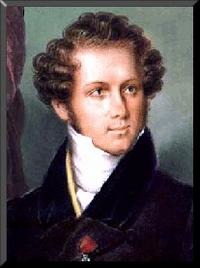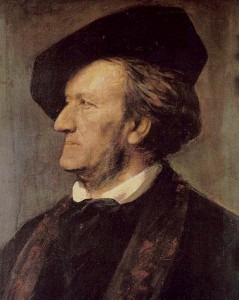
Vincenzo Bellini
Vincenzo Bellini, Norma “Casta Diva”
Norma was first produced in London in 1831, and failed to make an impression. However, a highly enthusiastic Richard Wagner staunchly defended the work and wrote that “even the most determined opponents of the new Italian school of music do this composition the justice of admitting that, speaking to the heart, it shows an inner earnestness of aim”. He even called it “a cure for the intellectual abstruseness of German composers.” When Wagner took up his appointment as music director of the Riga Opera House in 1837, he wasted no time in putting Norma on stage. In addition, once he arrived in Paris in September 1839, he composed an insertion aria for the first act of Norma. Based on words by an unnamed Italian political refugee, “Norma il predisse” (Norma, it has been predicted) was scored for bass and male chorus, and intended for performance by Luigi Lablache. In the event, Lablache refused Wagner’s compositional offer, and the aria was first published and performed in 1914.
Richard Wagner, Norma, “Norma il predisse, o Druidi”

Richard Wagner
Richard Wagner, Das Liebesverbot, “So spät und noch kein Brief”
Das Liebesverbot was first produced on 29 March 1836 in the Magdeburg Opera House, and was by all accounts, a dismal failure. Apparently, the prima donna and one of the leading tenors partially forgot both text and music, and had to improvise. It was suspected that the performers had an affair, something that did not sit well with the prima donna’s husband. Minutes before a projected second performance he stormed backstage and the ensuing brawl assured that the work never got off the ground. It was never again performed during Wagner’s lifetime, and the fully staged revival had to wait until 2008.
By September 1839, Richard had once again amassed a large amount of debt, and the Wagners were forced to flee Riga to escape their creditors. Since the authorities had already confiscated Wagner’s passport, the couple illegally booked a passage on a small boat and sailed straight into a horrendous storm. Mina Wagner suffered a miscarriage, and Richard came up with the character of the Flying Dutchman, who is sentenced to aimlessly travel the seas until he is redeemed by the love and sacrifice of a woman.
Richard Wagner, The Flying Dutchman, “Overture”
Having survived the journey, the couple eventually settled in Paris and would stay for two and a half years. Next time, we will take a closer look at the Parisian influences that significantly influenced and shaped the mature composer.



Das Liebesverbot was also staged at the Wexford Festival in 1994.